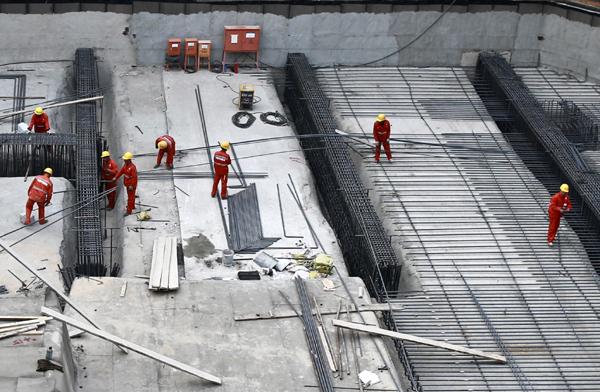


A construction team works on the second phase of Beijing's Changping Line on Thursday. The line is expected to open at the end of the year. FENG YONGBIN/CHINA DAILY
Move comes after construction costs soar in past few years
Beijing plans to attract more nongovernment funds to fuel the rapid expansion of the subway network, the company responsible for providing finance and planning new projects has revealed.
Construction costs have almost doubled in the past six years, the Beijing Infrastructure Investment Co said.
The technical and economic performance index, which reflects construction costs, increased to 1 billion yuan ($161 million) per kilometer in 2014 for subway lines in the downtown area, according to figures released by the company. The corresponding figure in 2007 was 571 million yuan.
The municipal government has annual allocations to fund subway construction projects, and these reached 15.5 billion yuan in 2014.
Most of the money is provided by the company, which has invested more than 251.3 billion yuan in the network in recent years-enough to build 110 Bird's Nest stadiums or 246 Water Cube aquatics centers.
Now the capital's municipal government has released a guideline designed to attract more funds from private sources to finance large public projects, including the subway.
Yang Xuhui, an official at the Beijing Municipal Commission of Development and Reform, the city's top economic planner, said companies can invest either alone or as a part of a consortium.
"More than one company has shown an interest," he added.
Beijing was the first city on the Chinese mainland to build a metro system, and there are now 18 lines covering a total distance of 527 kilometers. The total is scheduled to reach around 1,000 kilometers by 2020 to meet the huge demand from the capital's population of more than 21 million. The expansion should ease traffic congestion and reduce air pollution.
The cost of materials, labor, machinery and land acquisition and resettlement has also continued to rise, and this has pushed up the amount of investment needed, the company said.
Metro construction projects in other cities have also been affected by rising costs. It is estimated that at least 3 trillion yuan will be invested nationwide in networks that will cover a total distance of 6,000 kilometers by 2020, official Li Guoyong told China Business Times. Li works in the infrastructure projects section of the National Development and Reform Commission, the country's top economic planning agency.
There are currently two companies involved in running the capital's network-city-owned Beijing Mass Transit Railway Operation Corp, and Beijing MTR Corp, a public-private joint venture with Hong Kong's MTR.
On Feb 8, Beijing MTR Corp paid 15 billion yuan for the right to operate Line 16 for 30 years. It already runs Line 4 and Line 14.
Safety is a major concern both during the construction process and after new lines open.
Le Guiping, a spokesman for Beijing MTR Construction Administration, which is in charge of building the company's projects, said: "We have a safety and emergency command center that monitors the whole process from construction of the facilities to test runs."
The center came into operation in January.
A second monitoring center is designed to ensure that lines operate safely. This supplies information about passenger flows and other data to the government to help it reach decisions on the future development of the network.
 J-11 fighters in air exercise
J-11 fighters in air exercise Beauties dancing on the rings
Beauties dancing on the rings Attendants-to-be join Mr. & Miss Campus Contest
Attendants-to-be join Mr. & Miss Campus Contest Beijing's toughest anti-smoking law takes effect
Beijing's toughest anti-smoking law takes effect Family lives in cave for about 50 years in SW China
Family lives in cave for about 50 years in SW China PLA soldiers operating vehicle-mounted guns in drill
PLA soldiers operating vehicle-mounted guns in drill Blind carpenter in E China's Jiangxi
Blind carpenter in E China's Jiangxi China hosts overseas disaster relief exercise for the first time
China hosts overseas disaster relief exercise for the first time 20 pairs of twins who will become flight attendants in Sichuan
20 pairs of twins who will become flight attendants in Sichuan Obama is sowing discontent in S.China Sea
Obama is sowing discontent in S.China Sea Rescuers work through night to reach cruise ship survivors
Rescuers work through night to reach cruise ship survivors Driving through limbo
Driving through limbo Facing down MERS
Facing down MERSDay|Week